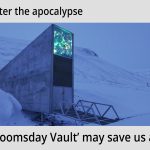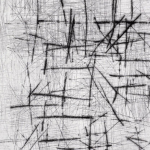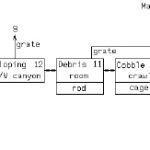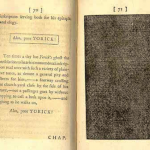Review of Heather Houser’s Ecosickness in Contemporary U.S. Fiction: Environment and Affect
Sharalyn SandersIn this review of Heather Houser’s Ecosickness in Contemporary U.S. Fiction, Sharalyn Sanders identifies the hopeful potential for environmental justice via contemporary literature. Finding a solidarity implied between intersectional identities and ecocriticism, Sander’s finds in Houser’s call for “scholarly activism” an antidote to the detachment which threatens to thwart environmental awareness.
The Peripheral Future: An Introduction to the Digital and Natural Ecologies Gathering
Lisa Swanstrom
In this introduction to her gathering on Digital and Natural Ecologies, Lisa Swanstrom pulls back from the tendency towards apocalyptic speculation that is commonplace in popular discourse of technology and nature. Instead, Swanstrom offers a more grounded discourse that addresses the impact of the digital on the natural.
Hyper and Deep Attention
Katherine Hayles
Katherine Hayles, Hyper and Deep Attention: http://www.jstor.org/stable/25595866?seq=1&cid=pdf-reference#references_tab_contents
Relational Ecology and the Digital Pharmakon
Bernard Stiegler
Bernard Stiegler's "Relational Ecology and the Digital Pharmakon."
Recounting Signatures: A Review of James McFarland’s Constellation
Donald CrossIn reviewing James McFarland’s Constellation, Donald Cross reminds readers of the rich potential of scholarly discourse. Beyond mere citations and their absence, Cross traces across the bright stars of Nietzsche and Benjamin (and Derrida) relationships worthy of serious consideration. In an age of copy/paste citations, impact reports, and optimized academics, pondering the constellations offers an opportunity to rediscover the subtle intensity of tracing forms in the void.
The Primacy of the Object
Julius GreveIn his review of Martin Paul Eve’s Pynchon and Philosophy: Wittgenstein, Foucault and Adorno, Julius Greve situates this new book on Pynchon within the upheavals produced by speculative realism and contemporary discourses on materialism. In doing so, Greve reminds us of what was always already the case: the literary-philosophical relevance of Pynchon, which turns out to be all the more inescapable in contemporary political climates.
The Last Novel
Joseph TabbiOriginally publication: The Schofield, Issue 1.1 - David Markson & Solitude - Summer 2015 (page 13). Reprinted with permission.
Nature is What Hurts
Robert SeguinIn this review of Timothy Morton's Hyperobjects, Robert Seguin contemplates the implication of the text's eponymous subject on art, philosophy, and politics. The "hyperobject," a hypothetical agglomeration of networked interactions with the potential to produce inescapable shifts in the very conditions of existence, emerges as the key consideration for the being in the present.
Digital Revision
Martin Paul EveIn this analytical, unabashedly philosophical engagement with Alex Galloway's "sneakily-titled" Laruelle Against the Digital, Martin Eve sides with the skeptics for whom "Laruelle proves a better diagnostician of epistemic illness than he is prescriber of a cure."
Love Will Tear Us Apart, Again: Tupitsyn Art Review
McKenzie WarkMcKenzie Wark explores the work of Masha Tupitsyn as a pathway into the conditions of life in the 21st Century, somewhere above (or below) the framework of mediated experience, even beyond the limits of what we often call "theory." With Tupitsyn, Wark troubles the current stasis of representation that stultifies thought in this age of unrepentantly industrialized culture, not by turning us away from the spectacle, but by smashing right through it, picking up its pieces, and discovering new things in the wreckage.
Pasts and Futures of Netprov
Rob Wittig
In Pasts and Futures of Netprov, Rob Wittig articlates a theory for Networked Improv Narratives, or "Netprovs." Wittig, an innovator in this novel form, situates netprov at the interesection of literature, drama, mass media, games, and new media. Transcribed from a presentation given at the Electronic Literature Organization conference in Morgantown, WV, Wittig explores a number of antecedents to the form, documents current exemplars of this practice, and invites readers to create their own networked improvisations.
Cave Gave Game: Subterranean Space as Videogame Place
Dennis Jerz
Jerz and Thomas identify our fascination with natural cave spaces, and then chart that fascination as it descends into digital realms, all in order to illustrate the importance of "the cave" as a metaphor for how we interact with our environment.
Towards Minor Literary Forms: Digital Literature and the Art of Failure
Illya Szilak
In this keynote address to the 2014 Electronic Literature Organization Conference, Illya Szilak highlights the power of "minor forms" in digital literature. Through a wide-ranging survey of works, Szilak identifies the tendency for "failure" in electronic literature as its most powerful feature: its capacity to deterritorialize the parameters of discourse and expand the potential of subjectivity in the process.